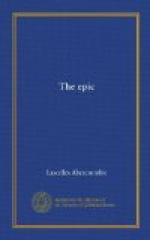But the gravest difficulty, and perhaps the most important, in poetry meant solely for recitation, is the difficulty of achieving verbal beauty, or rather of making verbal beauty tell. Vigorous but controlled imagination, formative power, insight into the significance of things—these are qualities which a poet must eminently possess; but these are qualities which may also be eminently possessed by men who cannot claim the title of poet. The real differentia of the poet is his command over the secret magic of words. Others may have as delighted a sense of this magic, but it is only the poet who can master it and do what he likes with it. And next to the invention of speaking itself, the most important invention for the poet has been the invention of writing and reading; for this has added immensely to the scope of his mastery over words. No poet will ever take the written word as a substitute for the spoken word; he knows that it is on the spoken word, and the spoken word only, that his art is founded. But he trusts his reader to do as he himself does—to receive written words always as the code of spoken words. To do so has wonderfully enlarged his technical opportunities; for apprehension is quicker and finer through the eye than through the ear. After the invention of reading, even poetry designed primarily for declamation (like drama or lyric) has depths and subtleties of art which were not possible for the primitive poet. Accordingly we find that, on the whole, in comparison with “literary” epic, the texture of “authentic” epic is flat and dull. The story may be superb, and its management may be superb; but the words in which the story lives do not come near the grandeur of Milton, or the exquisiteness of Virgil, or the deliciousness of Tasso. Indeed, if we are to say what is the real difference between Beowulf and Paradise Lost, we must simply say that Beowulf is not such good poetry. There is, of course, one tremendous exception; Homer is the one poet of authentic epic who had sufficient genius to make unfailingly, nobly beautiful poetry within the strict and hard conditions of purely auricular art. Compare Homer’s ambrosial glory with the descent tap-water of Hesiod; compare his continuous burnished gleam of wrought metal with the sparse grains that lie in the sandy diction of all the “authentic” epics of the other nations. And, by all ancient accounts, the other early Greek epics would not fare much better in the comparison. Homer’s singularity in this respect is overwhelming; but it is frequently forgotten, and especially by those who think to help in the Homeric question by comparing him with other “authentic” epics. Supposing (we can only just suppose it) a case were made out for the growth rather than the individual authorship of some “authentic” epic other than Homer; it could never have any bearing on the question of Homeric authorship, because no early epic is comparable with the poetry of Homer. Nothing, indeed, is comparable with the poetry of Homer, except poetry for whose individual authorship history unmistakably vouches.




